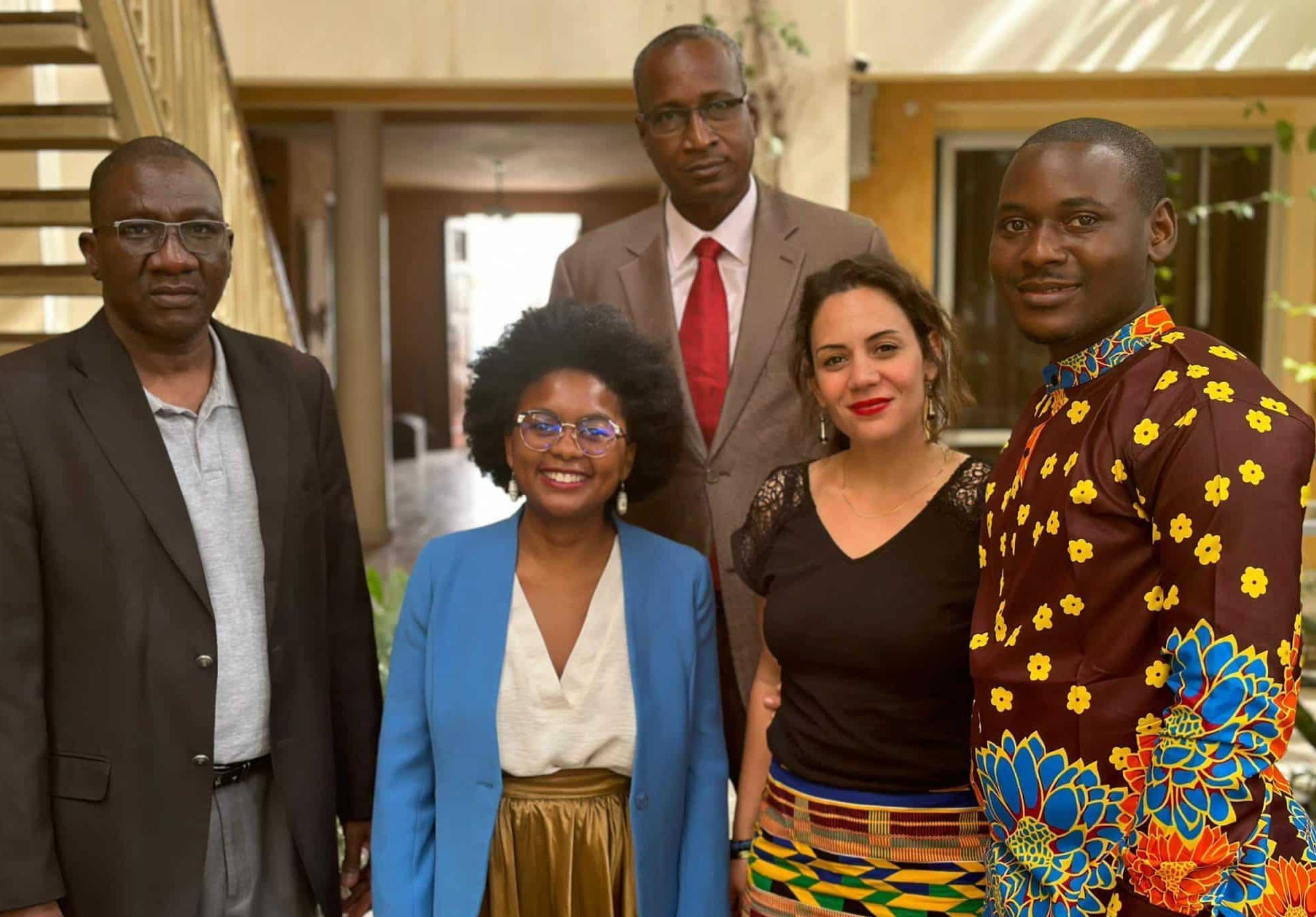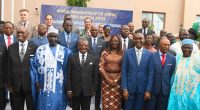For three days, a number of nationalities from sub-Saharan Africa and Europe are living together in the Senegalese city of Saint-Louis. The event is part of a Forum on Intermediate Cities organised by the Maîtrise et adaptation des villes intermédiaires au Sahel (MAVIL) programme, coordinated by Frenchwoman Zoé Vauquelin. In this interview with AFRIK 21, she discusses the current and future challenges facing these Sahelian territories, alongside Issagha Diagana, a university lecturer and urban planning adviser to the Prime Minister of Mauritania, Séga Sow, local finance inspector for the city of Kayes at the Mauritanian Ministry of Territorial Administration and Decentralisation, and Taman Mhoumadi, a young Franco-Comorian artist and trainer in climate issues.
For three days, a number of nationalities from sub-Saharan Africa and Europe are living together in the Senegalese city of Saint-Louis. The event is part of a Forum on Intermediate Cities organised by the Maîtrise et adaptation des villes intermédiaires au Sahel (MAVIL) programme, coordinated by Frenchwoman Zoé Vauquelin. In this interview with AFRIK 21, she discusses the current and future challenges facing these Sahelian territories, alongside Issagha Diagana, a university lecturer and urban planning adviser to the Prime Minister of Mauritania, Séga Sow, local finance inspector for the city of Kayes at the Mauritanian Ministry of Territorial Administration and Decentralisation, and Taman Mhoumadi, a young Franco-Comorian artist and trainer in climate issues.
Benoit-Ivan Wansi : The Forum “What trajectories for the cities of the Senegal River? A look at Kayes in Mali, Kaédi in Mauritania and Bakel in Senegal” opened yesterday, 12 December 2023, in the Senegalese city of Saint-Louis, with over 70 participants, mainly from Africa and Europe. What’s special about this event?
Zoé Vauquelin: The idea behind this forum is to mark a milestone for the Maîtrise et adaptation des villes intermédiaires au Sahel (MAVIL) programme, which is scheduled to run for 10 years. Its purpose is determined by the international association GRDR Migrations-Citoyenneté-Développement (based in France). The aim is to bring together local authorities and civil society in Senegal, Mali and Mauritania to discuss the challenges of urban transition in the Senegal river basin.
In a few words, how would you describe the face of Mauritanian cities?
Issagha Diagana: Mauritania is a country with a population of over 4.5 million, scattered throughout the country. The cities are confronted with natural phenomena that have an impact on urban organisation. In forty years, we have gone from being a nomadic country to an urban one, thanks to a national programme of sedentarisation. Urbanisation has been rapid and now stands at 60%. And the capital Nouakchott, which has an extraordinary past, has evolved very rapidly in recent years and is now rivalling other African cities in certain aspects of development.
The town of Kayes in Mali has at least 150,000 inhabitants. How do you manage such a large population, given the armed conflicts at national level and the prolonged drought, which of course goes hand in hand with water scarcity and low agricultural productivity?
Séga Sow: Since 2012, Mali has been plagued by insecurity, which started in the north and is now spreading towards the centre. The town of Kayes (in the west) has been spared these armed conflicts for the time being. With the political transition, the country is in the midst of a territorial reorganisation, with the creation of 11 new regions and a special status for the capital Bamako. The former Kayes region has been split into three new subdivisions. Since 1965, the main urban challenge has been the migration of people. Kayesians” account for up to 80% of the Malian diaspora in France.
Today, this community has become the driving force behind the local economy in Kayes (development of large-diameter wells for water supply, construction of schools and health centres). At our level, as support services, we are working to boost economic growth by supporting local authorities, in particular by promoting sustainable agriculture using the potential of the Senegal River.
From access to water and energy to transport, sanitation and housing infrastructure. Which of these basic services do you think people in intermediate towns need most at the moment?
Taman Mhoumadi: Water. I worked for the start-up Majik Water, which produces water from the air in Kenya. At the time, we went to meet local communities to see how the development of our solution could help them. These people used to travel a long way to get water, and when the resource became scarce, they started to fight. So the urgency of investing in Sustainable Development Goal 6 (SDG6) is very real. Innovative and appropriate solutions are needed.
In the two years of its existence, has the Mavil programme carried out any specific projects and investments in intermediate towns in relation to the SDGs?
Zoé Vauquelin: For 30 years now, the GRDR has been working alongside the towns and cities of the Sahel, focusing on institutional support, decentralisation, economic development and migration issues, as well as adaptation to climate change. With the Mavil programme, we have set ourselves the task of developing cities that are welcoming, attractive and resilient. For example, we have worked on the integrated management of water resources, particularly between cross-border towns in Senegal and Mauritania.
With the Abbé Pierre humanitarian foundation, we have also contributed to post-flood reconstruction and the promotion of sustainable housing by taking climate risks into account in the construction of housing in the Mauritanian town of Kaédi. In recent months, we have continued in the same vein with the launch of an integrated household waste management initiative in the municipality of Sélibabi in Mauritania.
Nearly 250 mayors from Africa took part in the 28th United Nations Climate Change Conference (COP28), which closed on 12 December 2023, where they succeeded in raising $467 million from foundations and international donors. Is this the best way to finance intermediate cities on the continent?
Issagha Diagana: Our local authorities did not wait for the COP to combat the effects of climate change, which is hitting them hard. This has been a long-standing battle for the municipalities of Bakel, Kayes and Kaedi. We need to be able to raise capital, and above all not rely on external funding. Our countries are rich, with enormous natural potential and valiant people, fertile land and abundant water (the Senegal River) that we should be relying on rather than the resources promised at climate negotiations, most of which never materialise.
Do we need to reconcile ancestral knowledge and new technologies if we are to preserve the environment in urban areas??
Séga Sow: Of course we need to develop new technologies, but we also need to take into account the basic elements of territorial development. The priority for our local authorities is to have good urban planning tools. Five years ago, Mali adopted a law for the return of public funds from the administrative accounts of local authorities (elected representatives report to the people), but it’s not yet effective. So we have existing approaches that need to be improved. In terms of sustainability, Mali’s towns and cities have begun their energy transition by gradually moving away from thermal power stations to solar panels, thanks to the natural sunshine of the Sahel region. In the building sector, there is a collective awareness of the need to turn our backs on concrete and cement in favour of local building materials. With this in mind, we’re training young people in Kayes to make compressed earth bricks (CEB). This technique helps to combat extreme heat. In my opinion, technology has put us a little behind, mainly because Africans just want to copy what is done in the West without adapting it to the local context.
Do you share this opinion? And what precise role do repatriates, such as yourself who lived in France before settling in Dakar, play in achieving sustainable development in their home towns?
Taman Mhoumadi: Not at all. Ancestral knowledge and technology are not contradictory. Absolutely not! The ‘repats’ have the will, the connection and the energy to reconnect with their origins, and their experiences acquired in their host countries can motivate decision-making based on sustainability. They are also an asset for the training of young people and, more broadly, I invite leaders to involve artists where grand speeches no longer work.
If you had sufficient funds at your disposal, what would be your priority in terms of green projects (solar power plant, waste recycling plant, deployment of electric vehicles, planting of green spaces, etc.)? And why?
Issagha Diagana: I would say “solar power plant” without hesitation. It allows young entrepreneurs to set up in business and households to manage their domestic economy. For example, the poor are the ones who spend the most because they buy in instalments and have no means of preserving their food. So energy is the key to the development of any urban area.
Can decentralised cooperation enable Mali’s towns and cities to respond effectively to their economic and climate challenges?
Séga Sow: The Kayes region works closely with towns in the Ile de France and Nord-Pas-de-Calais regions of France.
This cooperation, which began with twinning arrangements based on initiatives by our migrants, is already bearing fruit, particularly in terms of the transfer of skills and technical expertise. I would also add that the media have their part to play in reporting on shortcomings and publicising progress. For example, we are currently working on setting up community radio stations, particularly in Kayes.
What’s the next step after this three-day Forum?
Zoé Vauquelin: We will continue to support the urban transition in intermediate towns by producing reliable data, building the capacity of local players and improving access to essential services (water, sanitation, etc.). We will also be co-constructing a network of sustainable and inclusive cities that involve young people, women and all other categories of civil society.
Interview by Benoit-Ivan Wansi, Special envoy to Saint-Louis







